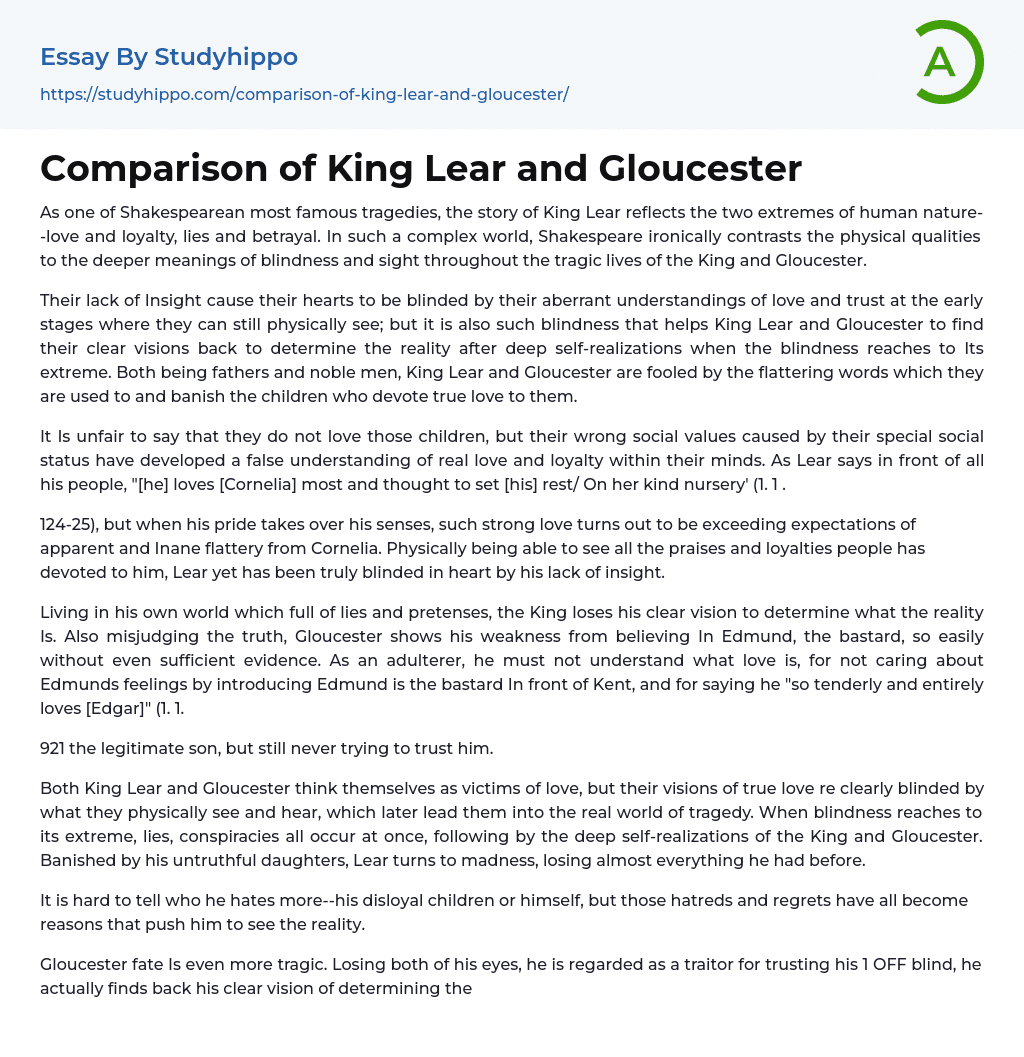As one of Shakespearean most famous tragedies, the story of King Lear reflects the two extremes of human nature--love and loyalty, lies and betrayal. In such a complex world, Shakespeare ironically contrasts the physical qualities to the deeper meanings of blindness and sight throughout the tragic lives of the King and Gloucester.
Their lack of Insight cause their hearts to be blinded by their aberrant understandings of love and trust at the early stages where they can still physically see; but it is also such blindness that helps King Lear and Gloucester to find their clear visions back to determine the reality after deep self-realizations when the blindness reaches to Its extreme. Both being fathers and noble men, King Lear and Gloucester are fooled by the flattering words which
...they are used to and banish the children who devote true love to them.
It Is unfair to say that they do not love those children, but their wrong social values caused by their special social status have developed a false understanding of real love and loyalty within their minds. As Lear says in front of all his people, "[he] loves [Cornelia] most and thought to set [his] rest/ On her kind nursery' (1. 1 .
124-25), but when his pride takes over his senses, such strong love turns out to be exceeding expectations of apparent and Inane flattery from Cornelia. Physically being able to see all the praises and loyalties people has devoted to him, Lear yet has been truly blinded in heart by his lack of insight.
Living in his own world which full of lies and pretenses, the King loses his clear
vision to determine what the reality Is. Also misjudging the truth, Gloucester shows his weakness from believing In Edmund, the bastard, so easily without even sufficient evidence. As an adulterer, he must not understand what love is, for not caring about Edmunds feelings by introducing Edmund is the bastard In front of Kent, and for saying he "so tenderly and entirely loves [Edgar]" (1. 1.
921 the legitimate son, but still never trying to trust him.
Both King Lear and Gloucester think themselves as victims of love, but their visions of true love re clearly blinded by what they physically see and hear, which later lead them into the real world of tragedy. When blindness reaches to its extreme, lies, conspiracies all occur at once, following by the deep self-realizations of the King and Gloucester. Banished by his untruthful daughters, Lear turns to madness, losing almost everything he had before.
It is hard to tell who he hates more--his disloyal children or himself, but those hatreds and regrets have all become reasons that push him to see the reality.
Gloucester fate Is even more tragic. Losing both of his eyes, he is regarded as a traitor for trusting his 1 OFF blind, he actually finds back his clear vision of determining the truth, and that is the real irony Shakespeare has added to the story. As Gloucester goes into deep desperation after the realization, he says, "l have no way and therefore want no eyes. " I stumbled when I saw" (4.
1 . 19-20). For him now, vision is not only from eyes, and sight is something comes from within. True vision derives from
love, trust, and clear insight, and it is the concept that Lear still fails to understand.
He questioned Gloucester statement, telling him to "get [him] glass eyes J And like a scurvy politician seem/ To see the things [he] dost not" (4. 6.
158-60). Even though Lear clearly knows the mistake himself and Gloucester have done, he still believes that vision is physically from eyes. Throughout their tragic experience, two men develop different understandings on what real vision is, but gladly, both of them have walked out from the shadow of blindness after being deeply harmed by the consequences of it. Gloucester chooses to show his bravery to fight with his son for the king at the end;
Lear finally chooses to be a good father rather than a king to spend his last time with his loving daughter. It is also the power of love that helps these two men to realize the reality and find back their ways. Love makes people blind but also makes people see.
King Lear and Gloucester both express their love but are still fooled by their misunderstandings of love. In contrast, t is Cornelia and Edgar who actually keep silent from the beginning truly devote their loves and loyalties to their fathers all the way till the end.
- Age Of Enlightenment essays
- Ethos essays
- Time essays
- Acceptance essays
- Meaning Of Life essays
- Reality essays
- Natural Law essays
- Political Philosophy essays
- Utilitarianism essays
- Existence essays
- Free Will essays
- Good And Evil essays
- Confucianism essays
- Relativism essays
- Conscience essays
- Environmentalism essays
- Empiricism essays
- Epistemology essays
- Ethics essays
- Existentialism essays
- Human Nature essays
- Individualism essays
- Metaphysics essays
- Philosophy Of Life essays
- Transcendentalism essays
- Truth essays
- Destiny essays
- Determinism essays
- Fate essays
- Functionalism essays
- Philosophers essays
- Pragmatism essays
- Future essays
- Child Observation essays
- Critical Reflection essays
- Teaching Philosophy essays
- Personal Philosophy essays
- Action Speak Louder Than Words essays
- Can Money Buy Happiness essays
- Values of Life essays
- Ethical dilemma essays
- Normative Ethics essays
- Virtue Ethics essays
- Belief essays
- Deontology essays
- Moral essays
- Virtue essays
- Work Ethic essays
- Henry David Thoreau essays
- Carl Jung essays




